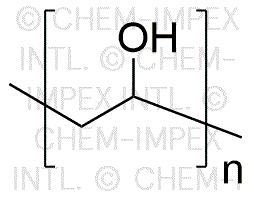Poly(vinyl alcohol) is widely utilized in research focused on various applications:
- Adhesives and Coatings: This compound is commonly used in the production of adhesives and coatings due to its excellent film-forming properties, providing strong bonding and protective layers in industries like construction and packaging.
- Textile Industry: It serves as a sizing agent in textiles, enhancing the strength and durability of fabrics. This application is crucial for manufacturers looking to improve the quality of their products.
- Pharmaceuticals: In the pharmaceutical field, it is used as a binder in tablet formulations, ensuring uniformity and stability of the medication, which is vital for patient safety and efficacy.
- Biodegradable Films: With growing environmental concerns, it is increasingly used to create biodegradable films for packaging, offering a sustainable alternative to traditional plastics.
- Cosmetics: The compound is also found in cosmetic formulations as a thickener and stabilizer, contributing to the texture and consistency of products like lotions and creams.
General Information
Properties
Safety and Regulations
Applications
Poly(vinyl alcohol) is widely utilized in research focused on various applications:
- Adhesives and Coatings: This compound is commonly used in the production of adhesives and coatings due to its excellent film-forming properties, providing strong bonding and protective layers in industries like construction and packaging.
- Textile Industry: It serves as a sizing agent in textiles, enhancing the strength and durability of fabrics. This application is crucial for manufacturers looking to improve the quality of their products.
- Pharmaceuticals: In the pharmaceutical field, it is used as a binder in tablet formulations, ensuring uniformity and stability of the medication, which is vital for patient safety and efficacy.
- Biodegradable Films: With growing environmental concerns, it is increasingly used to create biodegradable films for packaging, offering a sustainable alternative to traditional plastics.
- Cosmetics: The compound is also found in cosmetic formulations as a thickener and stabilizer, contributing to the texture and consistency of products like lotions and creams.
Documents
Safety Data Sheets (SDS)
The SDS provides comprehensive safety information on handling, storage, and disposal of the product.
Product Specification (PS)
The PS provides a comprehensive breakdown of the product’s properties, including chemical composition, physical state, purity, and storage requirements. It also details acceptable quality ranges and the product's intended applications.
Certificates of Analysis (COA)
Search for Certificates of Analysis (COA) by entering the products Lot Number. Lot and Batch Numbers can be found on a product’s label following the words ‘Lot’ or ‘Batch’.
*Catalog Number
*Lot Number
Certificates Of Origin (COO)
This COO confirms the country where the product was manufactured, and also details the materials and components used in it and whether it is derived from natural, synthetic, or other specific sources. This certificate may be required for customs, trade, and regulatory compliance.
*Catalog Number
*Lot Number
Safety Data Sheets (SDS)
The SDS provides comprehensive safety information on handling, storage, and disposal of the product.
DownloadProduct Specification (PS)
The PS provides a comprehensive breakdown of the product’s properties, including chemical composition, physical state, purity, and storage requirements. It also details acceptable quality ranges and the product's intended applications.
DownloadCertificates of Analysis (COA)
Search for Certificates of Analysis (COA) by entering the products Lot Number. Lot and Batch Numbers can be found on a product’s label following the words ‘Lot’ or ‘Batch’.
*Catalog Number
*Lot Number
Certificates Of Origin (COO)
This COO confirms the country where the product was manufactured, and also details the materials and components used in it and whether it is derived from natural, synthetic, or other specific sources. This certificate may be required for customs, trade, and regulatory compliance.


